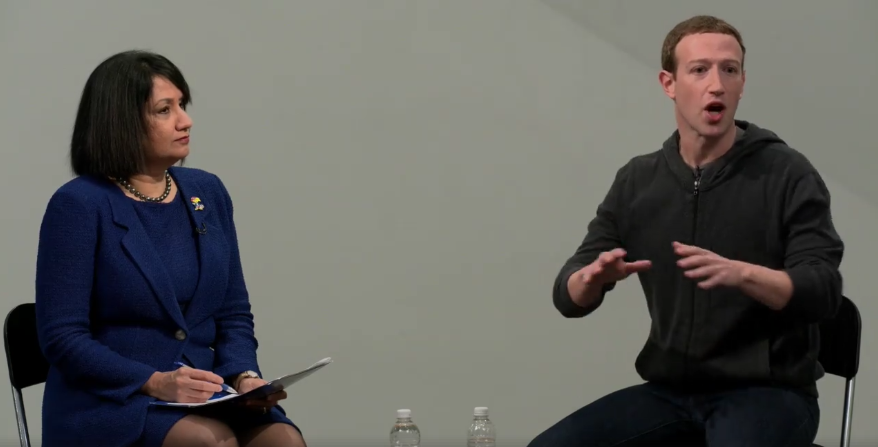Mark Zuckerberg’s interview at the University of Kansas on Friday was the moment for those who wonder whether the Facebook CEO will run for president in 2020 had been waiting for – the next data point in the chain.
The tone of the interview was informative in-and-of-itself, the interviewer was not only full of praise for his every response – even offering a high-five at one point – but also didn’t ask any of the questions you’d expect a journalist to ask: why are you doing this now, it’s not like Facebook only just got popular? Why have you coupled this tour with interviews, a manifesto post and political stances? And… are. You. Running. For. President?
Zuckerberg has answered that last question before, asserting that he isn’t, but his latest trip – and the way he’s ending it – cast enough new light on the topic to warrant another ask. That being said, rejecting the assumption is exactly what he’d do whether he was running or not, the difference is that if he were genuinely not running, he wouldn’t mind going out of his way to put the issue to bed. This kind of implicit “I’ve already answered that, I’ll refer you to my May 21 post” that he’s gone for tastes all too much like the kind of response White House correspondents would receive in the James S. Brady Press Briefing Room.
#facebook4communities
He opened by justifying his trip on the idea of his challenge for the year, of getting out of his “bubble” and visiting real America, from which he pivoted to tech’s role in globalisation. “We’re also starting to see they’ve left a lot of people behind. There’s a big gap in the country, and its getting bigger,” he said, and from which he immediately pivoted to political divisions, saying, “I think that’s at the heart of a lot of the politically divisive debates that we have.” All of which was delivered looking not back at the interviewer, but straight out to the audience, and the camera.
One needs to exercise caution when reviewing things of this nature, it’d be very easy to retrofit evidence to hypothesis. For example, he spoke about trade, small businesses, community and globalisation; all of which are political issues but which directly concern Facebook. So, generally, a public figure opining on such topics could be construed as a potential presidential candidate; but that’s not necessarily the case with Zuckerberg, given that it’d be perfectly reasonable for him to meditate on these kind of issues in considering Facebook’s future.
However, he also commented on the opioid crisis, international trade, military spouses, US political divisions and jobs, which are tangentially related to Facebook at best, and it’s unusual for big-time CEOs to engage on matters which don’t directly concern them. On top of which – and where the real crux of things lies – was his mention of community. This wasn’t just the recognition of the importance of community, or Facebook’s role in community, but it was his central pitch from which the interview began and, crucially, the target of further pivoting.
Mark Zuckerberg is going around the country doing things only a politician would do ?#Zuck4Presidenthttps://t.co/4mQJ5PmtiG pic.twitter.com/b0VEo5CcW1
— The Tylt (@TheTylt) May 3, 2017
With his trip justified, the interviewer asked what he’d been struck by most – enter ‘community’ stage left – “The biggest takeaway by far […] is that community, and especially local communities, I think are much more important to people than we realise,” he said, as though speaking directly to Clinton’s core voters. From then on other topics like military spouses and the opioid crisis were pivoted to community. The pivot is important because it’s the core mechanism of campaigning, the method by which politicians are able to stay “on message” regardless of what’s thrown at them. Sometimes tactically deployed by other public figures, but only strategically prevalent in politics, and which he may well have learned from the bi-partisan troupe of political advisers he hired earlier this year.
#community4facebook
The idea of community is closely related to Facebook, especially its recent community push for small businesses and the relaunch of its Events app as Facebook Local. And while Zuckerberg’s newfound desire to “get out of my bubble in San Francisco […] and see how people were thinking about their work, and their lives, and think about their future and opportunities, and what they were worried about,” is unorthodox for a CEO, it would be instructive to a company like Facebook.
Not only does it fit with a number of new product pushes, but it also comes shortly after the company’s ethical credibility came under fire from ex-president Sean Parker and others. The critics used the language of addiction, referring to the “dopamine hit” the platform is designed to provide, conflating the effect of using Facebook with the opioid crisis (the part of the interview most picked up by the press.)
If Zuckerberg is not running for president, he is redefining the role of a big-industry CEO in US life, turning the concept of his duty and the role of his platform towards the grandest of issues. He is turning his personal brand into part of the value proposition of Facebook to its users, talking about tech’s effect on US life; potentially in an attempt to boost its pedestrian approval ratings.
This poses interesting questions, to many who have thought of the influence companies like Google and Facebook have, it will have occurred to them that the CEO of Facebook may have more power than the US president. This could become troubling given that CEOs like Zuckerberg are not voted for and do not take an oath of office. But a US citizen can’t necessarily “opt-out” of being a US citizen, while a Facebook user can stop using the platform fairly easily, so Zuckerberg’s power at the helm of Facebook is much more flakey than that of the occupant of the Oval Office. In trying to shape US life each role would offer opportunities the other does not.
In either case it seems to be that he does have such ambitions, so US Facebook users can strap in for the ride ahead either way. I offer a few concluding observations in trying to ascertain which direction he might take.
#zuck4pres?
Firstly, it’s interesting to note the kind of states which have been visited by Zuckerberg and mentioned in his public statements. The coasts, New England and the deep south don’t get much of a mention. He seems to be all about the battleground, heartland states.
Zuckerberg is also managing to distance himself nicely from the image of a geeky, engineering, tech CEO and is starting to talk about societal issues in plain-spoken, but authoritative tones. Beyond his constant reference to community, he dropped in a couple of mentions of sociological thinking and evidence, all the while focusing his answers on local lives, like police officers. Vintage ‘hearts and minds’ stuff.
And in doing so the position Zuckerberg is articulating on the issues is one which occupies the electorally-successful centre ground very effectively. He is well-known to generally be a bit of a lefty – tech CEOs tend to be further left than Bernie Sanders on most social issues – but he is appealing to the sceptical side of globalisation which was a winning stance for Trump.
Further, using “community” as a central pitch is, if done for political reasons, an exquisite choice. The idea of community is generally considered to be a right-wing value which the left aren’t against, but have neglected in favour of other issues which don’t naturally sit with it, like diversity (if you’re interested, Jonathan Haidt‘s book The Righteous Mind is particularly instructive on left/right values, and has been condensed into an obligatory TED talk).
Simply using “community” to spearhead a campaign will appeal to the right, and Zuckerberg is uniquely placed to tweak the understanding of community in progressive terms – removing geography from the concept and basing it online, allowing people to form communities around shared identities, circumstances and interests – thus bringing in the left.
We then come to his dealing with the Russian election interference, which was particularly illuminating. He committed to fixing the issue on the grounds of Facebook’s integrity (a solid show of principle) and didn’t pull his punches in the language he used in presenting a front to Russian interference. This rhetoric will have afforded him ticks on defence and international politics, two areas in which he will be assumed to be lacking experience.
Sticking with Russia, he went on to point out that he had 10,000 employees working on security and safety and committed to doubling that number. Now, what other techy-type would deal with an issue in that manner? Rejecting the usual Silicon Valley method – of locking a team of engineers in a room for a few weeks to develop an algorithm or two to deal with the issue – and instead throwing people at the problem? It runs entirely counter to the tech ethos. But throwing people at the problem does have one benefit: it will be understandable to the public, even the most technophobic member of the electorate will interpret it as a clear display of strength and commitment. It is eerily close to the oft-promised initiative to double boarder patrols.
Also, broader questions arise on top of all of the esoteric political analysis, like why did he tour the US? Facebook has over 2 billion users, around 200 million of whom are in the US. If he’s so damn set on building communities then why is he spending a year visiting a country which he is presumably more familiar with than any other country Facebook operates in and only accounts for 10% of users? Any backpacker will tell you that you can understand far more communities far more deeply in the space of a year by travelling the world. And as for his annual “personal challenge” a world tour would have been altogether more – how can I put this – challenging.
If he is running, he should continue to use his current position effectively and to exercise the deep level of thought that is clearly being applied to the endeavour. There are just two things he’s going to have to deal with. The diversity issues in Facebook are going to have to get solved in the next year or two, lest he be labelled a hypocrite or his campaign turn him back into “the tech guy”. And secondly, though he’s made a lot of progress from where he was towards grasping the elusive “presidential voice“, he has further to go. He has achieved the right level of passion, and can speak with a commanding level of surety while appealing to the requisite level of humility, but he needs to slow down and take a step towards speaking with the air of confidence and calm Obama was capable of.
Overall, Zuckerberg is doing a lot which he doesn’t need to do, if he wanted to change the focus of Facebook he could do it in the usual tech way of creating a UX so enticing that people gravitate towards it. His engagement in public discourse at the highest level is, at least, an indication of the scale of the role he wants Facebook to play in people’s lives. But I don’t yet see how he will be able to solve some of the issues he’s articulated a commitment to whilst also maintaining the impartiality he’s imbued Facebook with recently.
So, Trump is right to be worried about a Zuckerberg challenge in 2020, and may regret the precedent he set with his business affairs, now Zuckerberg has created a new class of shares which will allow him to keep control of the company even while “serving in a government position or office.”
It’s early days and while speculation is tempting and evidence is aplenty, it’s still difficult to fathom. But, gun to my head, I’d say he’s running.











